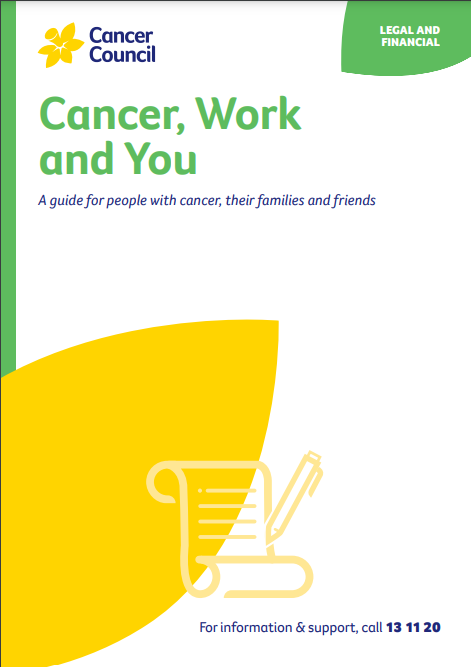- Home
- About Cancer
- Coping with a diagnosis
- Cancer, work and you
- For workers
- Self-employment and cancer
- Managing your business
Managing your business
To keep your business running, you may need a business plan to manage any changes. Talk to your health care team about what to expect from treatment so you can decide what you can handle.
These suggestions may help you combine work and treatment:
- Be realistic about how much work you can continue to do.
- Prioritise what aspects of working/owning your business are important to you and what you can let go or delegate.
- Decide what has to be done now and what can be left until later.
- Use your energy to do tasks you enjoy or that you must do yourself.
- Consider subcontracting, hiring temporary staff or asking friends in the same trade or profession to lend a hand.
- Ask for or accept any offers of help from family and friends.
- Consider working from home or changing your role.
- Let staff know what changes you make to keep the business running.
- If possible, aim to finish any high-priority or complicated work before you start treatment.
- Think about other ways to do your job. Could you travel less? Could you work from home more? Would it be practical to use technologies such as smartphones and video calls instead of in-person meetings? If you ship goods, could a fulfilment house handle this temporarily?
- Check any existing insurance policies for entitlements and let your insurance company know about changes to your work situation.
- Seek advice from any professional associations you belong to.
- Cancer Council may be able to help connect you to a legal or financial adviser. Call 13 11 20 to find out what services are available in your area and whether you are eligible for this assistance.
- Cancer Council may be able to refer you to a financial adviser or small business accountant for support. Contact 13 11 20 to find out what services are available in your state or territory.
Download our fact sheet on Insurance and cancer.
→ READ MORE: Telling clients about the cancer
Podcast: Coping with a cancer diagnosis
Listen to more of our podcast for people affected by cancer
More resources
Brooke Russell, Principal Occupational Therapist, WA Cancer Occupational Therapy, WA; Bianca Alessi, 13 11 20 Consultant, Cancer Council SA; Dr Prunella Blinman, Medical Oncologist, Concord Cancer Centre, Concord Repatriation General Hospital, NSW; James Chirgwin, Physiotherapist, The Wesley Hospital, QLD; Danielle Curnoe, Consumer; Simon Gates, Barrister, Tasmanian Bar, TAS; Justin Hargreaves, Medical Oncology Nurse Practitioner, Bendigo Health Cancer Centre, VIC; Kaylene Jacques, Director, People and Communications, Cancer Council NSW; Alex Kelly, Senior People Attraction Advisor, Human Resources, Allianz Australia Insurance, NSW; Legal reviewer; Georgina Lohse, Social Worker, GV Health, VIC; Lesley McQuire, Consumer, Cancer Voices NSW.
View the Cancer Council NSW editorial policy.
View all publications or call 13 11 20 for free printed copies.
Need to talk?
Support services
Coping with cancer?
Speak to a health professional or to someone who has been there, or find a support group or forum
Need legal and financial assistance?
Pro bono services, financial and legal assistance, and no interest loans
Cancer information
Dealing with the diagnosis
Common reactions to a cancer diagnosis and how to find hope
Resource hub
Guides, fact sheets, videos, podcasts and more for people with cancer, their families and friends

